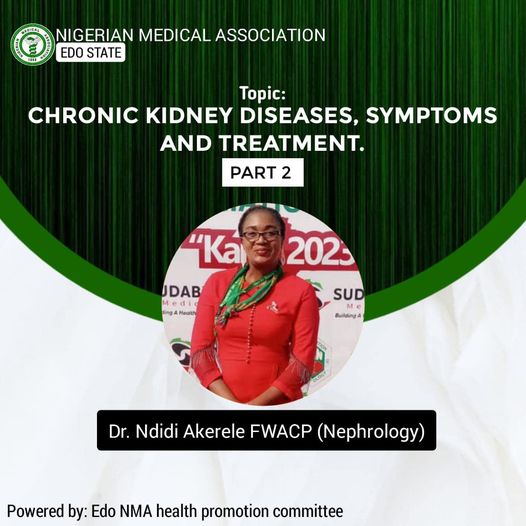Continuation from the previous post.
Complications
Chronic kidney disease can affect almost every part of the body. Potential complications include:
• Fluid retention, which could lead to swelling in the arms and legs, high blood pressure, or fluid in the lungs (pulmonary edema)
• A sudden rise in potassium levels in the blood (hyperkalemia), which could impair the heart’s function and can be life-threatening
• Anemia
• Heart disease
• Weak bones and an increased risk of bone fractures
• Decreased sex drive, erectile dysfunction or reduced fertility
• Damage to the central nervous system, which can cause difficulty concentrating, personality changes or seizures
• Decreased immune response, which makes them more vulnerable to infection
• Pericarditis, an inflammation of the sac-like membrane that envelops the heart (pericardium)
• Pregnancy complications that carry risks for the mother and the developing fetus
• Irreversible damage to the kidneys (end-stage kidney disease), eventually requiring either dialysis or a kidney transplant for survival
Prevention
To reduce the risk of developing kidney disease:
• Avoid abuse of over-the-counter medications like Non steroidal anti-inflammatory drugs ie pain relievers, such as aspirin, ibuprofen and acetaminophen. Taking too many pain relievers for a long time could lead to kidney damage.
• Maintain a healthy weight. Weight for those obese and overweight. If you’re at a healthy weight, maintain it by being physically active most days of the week.
• Don’t smoke. Cigarette smoking can damage your kidneys and make existing kidney damage worse.
• Manage medical conditions like diabetes, high blood pressure with your doctor’s help.
Diagnosis
For kidney disease diagnosis, the individuals may also need certain tests and procedures to determine how severe the kidney disease is (stage). Tests might include:
• Blood tests. Kidney function tests look for the level of kidney impairment, such as creatinine and urea, in the blood.
• Urine tests. Analyzing a sample of the urine can reveal abnormalities that point to chronic kidney disease and help identify the cause of chronic kidney disease.
• Imaging tests. The doctor might use ultrasound to assess the kidneys’ structure and size. Other imaging tests might be used in some cases.
• Kidney biopsy. The doctor might recommend a kidney biopsy, which involves removing a sample of kidney tissue. The biopsy sample is sent to a lab for testing to help determine what’s causing your kidney problem.
Treatment
Depending on the cause, some types of kidney disease can be treated. Often, though, chronic kidney disease has no cure.
Treatment usually consists of measures to help control signs and symptoms, reduce complications, and slow progression of the disease. If the kidneys become severely damaged, they may require treatment for end-stage kidney disease.
Doctors will work to slow or control the cause of the kidney disease. But kidney damage can continue to worsen even when an underlying condition, such as diabetes mellitus or high blood pressure, has been controlled.
Treating complications
Kidney disease complications can be controlled to make people with kidney disease more comfortable. Treatments might include:
• High blood pressure medications. Medications will be recommended to lower the blood pressure and to preserve kidney function.
• Medications to relieve swelling. People with chronic kidney disease often retain fluids. This can lead to swelling in the legs as well as high blood pressure. Medications called diuretics can help maintain the balance of fluids in the body.
• Medications to treat anemia. Supplements of the hormone erythropoietin, sometimes with added iron, help produce more red blood cells. This might relieve fatigue and weakness associated with anemia.
• Medications to lower cholesterol levels. Medications like statins may be recommended to lower cholesterol level. People with chronic kidney disease often have high levels of bad cholesterol, which can increase the risk of heart disease.
• Medications to protect the bones. Calcium and vitamin D supplements can help prevent weak bones and lower the risk of fracture.
• A lower protein diet to minimize waste products in the blood. A registered dietitian can suggest ways to lower your protein intake while still eating a healthy diet.
• Doctors might recommend regular follow-up testing to see whether your kidney disease remains stable or progresses.
Treatment for end-stage kidney disease
If the kidneys can’t keep up with waste and fluid clearance on their own, at that point, the individuals need dialysis or a kidney transplant.
• Dialysis. Dialysis artificially removes waste products and extra fluid from the blood.
• In hemodialysis, a machine filters waste and excess fluids in the blood.
In peritoneal dialysis, a thin tube inserted into the abdomen fills the abdominal cavity with a dialysis solution that absorbs waste and excess fluids. After a time, the dialysis solution drains from the body, carrying the waste with it.
• Kidney transplant. A kidney transplant involves surgically placing a healthy kidney from a donor into the recipient. Transplanted kidneys can come from deceased or living donors.
After a transplant, the individual will need to take medications for the rest of the life to keep the body from rejecting the new organ.
Conservative management
For those who choose not to have dialysis or a kidney transplant, a third option is to treat your kidney failure with conservative measures.
Conservative measures likely will include symptom management, advance care planning and care to keep you comfortable (palliative care).
EDO NMA WALL OF FAME CRECHE AND HOLDING CENTRE
EDO NMA WALL OF FAME CRECHE AND HOLDING CENTRE Admission ongoing, visit http://bit.ly/edonma_edu for more information


